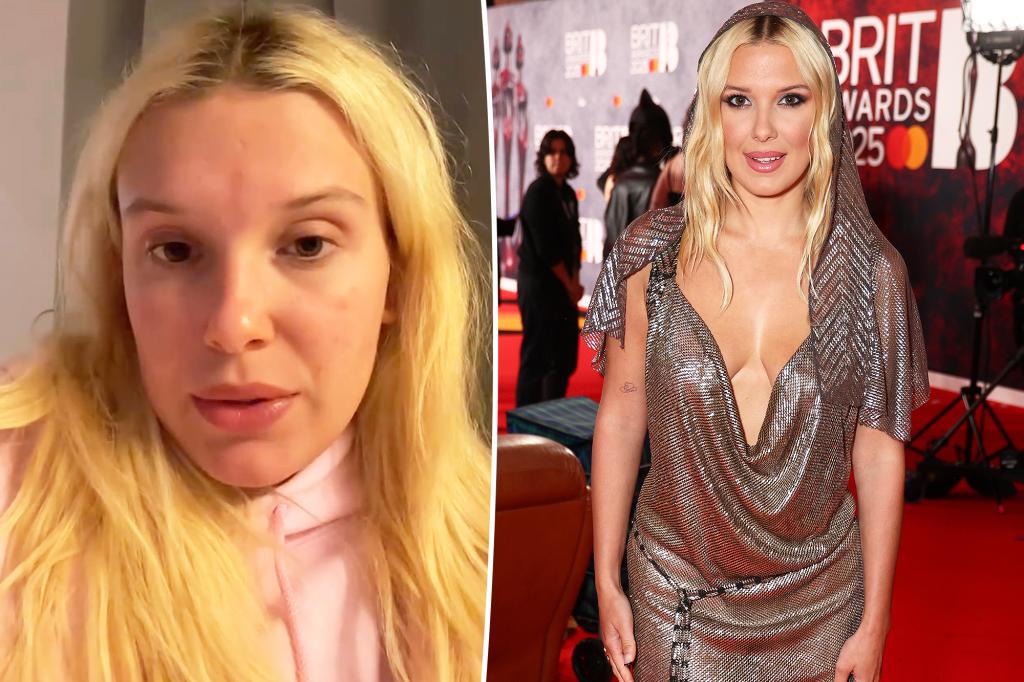Millie Bobby Brown, the talented actress known for her roles in Stranger Things and Enola Holmes, recently found herself at the center of a conversation that extends far beyond her own experience. At just 21 years old, Millie has been in the public eye since she was 10, growing up under the relentless gaze of fans, critics, and the media. After attending the premiere of her film Electric State, Millie faced criticism for looking "old," a narrative that she describes as "disturbing." In a heartfelt video shared on Instagram, Millie addressed not just the personal attacks but also the broader cultural issue of how society treats young women as they grow and evolve. Her powerful words struck a chord, resonating with many who have faced similar scrutiny and highlighting the need for change in how we perceive and discuss young women in the public eye.
Millie’s journey in the entertainment industry began when she was just a child, and she has since grown into a young woman. Yet, she shared that many people seem unable—or unwilling—to accept her evolution. "I started in this industry when I was 10 years old. I grew up in front of the world, and for some reason, people can’t seem to grow with me," she explained. This sentiment speaks to a deeper issue: society’s tendency to freeze women in time, particularly when they begin their careers as young girls. For Millie, this means that some fans and critics still see her as the 12-year-old she was when Stranger Things first aired, unable to reconcile that image with the confident, mature woman she has become. "And because I don’t [stay frozen in time], I’m now a target," she said, pointing out the unfair standards applied to her and so many others like her.
The criticism Millie has faced is not just about her appearance but also about the fact that she is growing up on her own terms. Her recent platinum blonde makeover, which some have compared to Britney Spears, sparked speculation that she might be vying for a role in the pop star’s upcoming biopic. While this chatter is harmless on the surface, it underscores a larger problem: the constant scrutiny of women’s choices, from their looks to their career moves. Millie has been open about her desire to explore different roles and express herself in new ways, but this has often been met with criticism rather than support. As she noted, "Disillusioned people can’t handle seeing a girl become a woman on her terms, not theirs." This sentiment reflects the tension many young women face as they navigate the challenges of growing up in a world that often resists change.
Millie also called out the media for its role in perpetuating these harmful narratives. She highlighted how adult writers and reporters have spent countless hours dissecting her face, body, and choices, often with mocking or critical tones. "The fact that adult writers are spending their time dissecting my face, my body, my choices, it’s disturbing," she said. What’s even more troubling, in her view, is that some of these critiques come from women themselves. This observation sheds light on the ways in which internalized misogyny and societal conditioning can lead women to perpetuate the very systems that oppress them. Millie’s words serve as a reminder that we all have a responsibility to challenge these harmful behaviors and create a more supportive and inclusive environment for young women.
In response to the constant criticism, Millie has made it clear that she refuses to apologize for growing up. "I refuse to make myself smaller to fit the unrealistic expectations of people who can’t handle seeing a girl become a woman," she declared. This statement is a powerful rejection of the societal pressure placed on women to conform to narrow standards of beauty, behavior, and identity. By embracing her growth and individuality, Millie is not only standing up for herself but also setting an example for other young women who may feel the weight of these expectations. Her message is one of resilience and self-acceptance, encouraging others to reject the toxicity of constant criticism and instead focus on their own journeys of self-discovery and empowerment.
Ultimately, Millie’s call to action goes beyond her own experience. She implored her followers to "do better," not just for her but for every young girl who deserves to grow up without fear of being torn apart for simply existing. "We have become a society where it’s so much easier to criticize than it is to pay a compliment," she said, urging people to shift their focus toward kindness and encouragement. Millie’s words are a reminder that change starts with each of us, and by fostering a culture of compassion and understanding, we can create a world where young women are celebrated for who they are, not shamed for who they are becoming. As Millie continues to navigate the challenges of her career and public life, her message of resilience and hope serves as a beacon for anyone who has ever felt the weight of societal expectations and the courage to rise above them.
